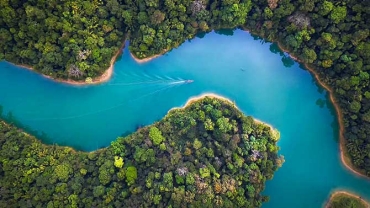
Jaap de Jong (WWF) on the importance of biodiversity and COP15
The UN summit on biodiversity (COP15) starts right on time. Earth's natural capital is in decline and thus our first line of life is under pressure. This has implications for all of us, including the future resilience of organizations.
We asked our network of experts about the expectations and opportunities of this summit, because only together can we make progress. Today: Jaap de Jong, project manager ‘Dutch Fund for Climate and Development’ at the World Wide Fund for Nature (WWF).

Jaap de Jong: 'Our economic systems cannot function without healthy ecosystems'
It is now four years since the last UN biodiversity summit and the call for action is loud everywhere. How would you describe and characterize COP15?
'As an unmissable opportunity to address the ever-accelerating loss of biodiversity. The world is now gathered to create a 2030 Nature Action Plan and agree on new global targets. This agreement should set the world on a new course to address alarming biodiversity loss. But it's about more than biodiversity.'
'Reaching an agreement is vital to combating the climate crisis, guaranteeing food and water security, reducing our vulnerability to future pandemics, in short: achieving the United Nations Sustainable Development Goals. This is simply the moment to set in motion a wave of change for the benefit of nature and people.
A new direction? The devil's advocate would say that is not realistic.
'None of the goals world leaders set for Earth's biodiversity a decade ago have been met. It has only gotten worse. One million species are at risk of extinction because of the way we live and how we exploit nature. Globally, the average population size of mammals, birds, amphibians, reptiles and fish declined 69 percent between 1970 and 2016. We are overexploiting our planet. That is indeed the reality.
'I am convinced that we can only solve the climate crisis and the biodiversity crisis in conjunction with one another. We cannot stop climate change if we let the crisis in nature continue unabated. On the other hand, if we are not able to limit warming to one and a half degrees Celsius, climate change will probably become the main cause of biodiversity loss in the coming decades.
Frankly, that sounds pretty depressing. So how to proceed now?
'We cannot waste another ten years: now is the time. We as humans are largely dependent on nature, so by overcharging nature we are putting the viability of the planet and for humans themselves at risk.'
'The World Wild Fund for Nature, is therefore calling for an ambitious global biodiversity agreement, similar to the Paris Climate Agreement. We want politicians and world leaders to make decisions that do not come at the expense of nature, but instead contribute to its protection and restoration. Stopping the loss of ecosystems is too little, there must be more nature: the earth must become ‘nature-positive’. To achieve this, thirty percent of all land, sea and freshwater must be protected and degraded ecosystems restored by 2030. This can only succeed if the remaining seventy percent is managed sustainably.'
The Global Biodiversity Framework (GBF) has formulated a first draft of four long-term goals for 2050 and over 20 sub-targets for 2030. These targets will be negotiated at COP15. One of the targets is ‘redirecting, repurposing, reforming or eliminating incentives’. What are your thoughts on this goal?
'Redirecting investments in activities harmful to nature to activities that protect or restore nature
is the key to closing the biodiversity financing gap because it reduces the need for additional financial resources. By 2030, it is estimated, $700 billion a year will be needed to stem biodiversity loss. In 2019, less than $150 billion was invested in more biodiversity. Without sufficient funding, any plan to reverse the negative trend in nature loss will fail
'Because of the urgency, once the post-2020 GRF is established, stakeholders should immediately begin identifying financing and investments that are harmful to biodiversity.'
If this target is formally established, what does this mean to the broader business world? What should companies and factories do if non-commitment gives way to a real commitment?
'More money going to nature alone is not enough. A reduction in funding and investments that harm nature is also needed. Unfortunately, governments allocate $1.8 trillion annually (1.5 trillion euros, that is: fifteen with eleven zeros, ed.) to environmentally damaging subsidies. The new framework must include ambitious targets to urgently review, reform and reallocate these harmful subsidies.'
'Research by the World Economic Forum shows that $44 trillion in economic value is highly or moderately dependent on nature. That's about half of the world's gross domestic product. This means that our economic and financial systems cannot function without healthy ecosystems.
'Central banks and financial regulators must actively address climate change and nature loss.'
Is that your message to business?
'My message to business? The money to protect nature is already there with businesses. Annually, more money goes to activities harmful to nature compared to activities which are positive for nature. To create a future for nature, this must be reversed as soon as possible. There are actually plenty of opportunities for that. The transition to a nature-positive economy can generate an annual business value of $10.1 trillion and create 395 million jobs by 2030. This is why aligning public and private financial flows with the goals and objectives of the GBF is crucial and should be at the top of the COP15 finance discussion. And central banks and financial regulators really need to start actively addressing climate change and natural loss.'
The Convention on Biological Diversity, as mentioned earlier, has several objectives. From your knowledge and expertise, which objective do you think is important to highlight?
'I would go for the objective of greening the financial sector. Currently, way more money is invested in sectors harming nature than projects that benefitting biodiversity. While there are great financial risks associated with the loss of biodiversity and the ecosystem services that nature provides, such as pollination and fresh water. By putting the value of nature and the link between financial and ecological risks into financial decision-making, the financial sector can support rather than harm the planet's natural capital.
How can the financial sector do this?
'Financial institutions can be a powerful force for change. For example, public and private financial flows can be aligned with nature-positive practices and so-called nature-based solutions. And the time is now to remove or redirect harmful incentives, including perverse subsidies.'
In addition, central banks and other financial regulators should regulate, with banks and investors providing insight into the extent to which their portfolios are impacted and dependent on nature and take action where this involves financial risks.




















